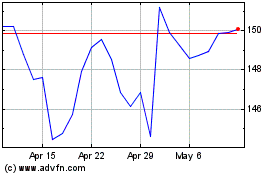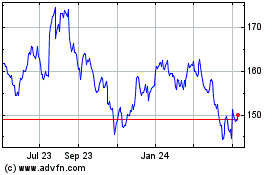J&J Stalks Swiss Drug Company -- WSJ
November 26 2016 - 3:02AM
Dow Jones News
By Jonathan D. Rockoff
Johnson & Johnson said Friday it is in "preliminary
discussions" with Swiss drug company Actelion Pharmaceuticals Ltd.,
a deal that would help the health-products company overcome any
lost momentum for its top-selling drug.
J&J, which is based in New Brunswick, N.J., has been trying
to reassure Wall Street that it can withstand looming competition
to its drug Remicade, an autoimmune therapy that had $4.5 billion
in U.S. sales last year. Pfizer Inc. has said it plans to start
selling its copy, Inflectra, in the U.S. this month.
J&J says it has several new drugs in development whose
launch could make up for any revenue loss.
A deal for Actelion, however, would help J&J quickly plug
the lost sales, which analysts estimate could amount to $1 billion
in 2017. Actelion sells drugs for rare diseases, such as an artery
disorder that affects the lung and heart known as pulmonary
arterial hypertension. The company reported about 1.785 billion
Swiss francs ($1.8 billion) in sales for the first nine months of
this year.
A deal for all of Actelion would come at a steep price.
Bloomberg reported J&J's interest in the Swiss company on
Thursday. Applying a typical takeover premium of 25% or more to its
market capitalization at Wednesday's market close, Actelion could
fetch more than $20 billion.
Shares of Actelion rose nearly 17% to 182.50 Swiss francs
($184.03) on the SIX Swiss Exchange on Friday, after the company
confirmed J&J had approached it about a possible
transaction.
With a market value of more than $300 billion and nearly $40
billion in cash overseas, J&J could afford the high price.
J&J's biggest deal to date was the $21 billion acquisition of
trauma-device maker Synthes in 2011.
Both J&J and Actelion cautioned in their statements that a
transaction wouldn't necessarily happen.
It wasn't clear where talks between the companies stand or
whether Actelion is receptive.
Actelion was founded in 1997 by husband-and-wife team Jean-Paul
and Martine Clozel and other former Roche Holding Ltd. employees
who left the Swiss drug firm after it decided not to pursue a
project their group was working on, according to Actelion's
website.
In 2000, Actelion went public and its valuation has climbed
sharply since then. Last year, the company reported revenue of 2.05
billion Swiss francs and a profit of 551.9 million Swiss
francs.
This year, it averted a decline in revenue after its
best-selling drug, Tracleer, lost patent protection, thanks to
swift sales gains for new pulmonary arterial hypertension drugs
Opsumit and Uptravi.
Johnson & Johnson makes an array of products, from baby soap
to Tylenol pills and devices that manage diabetes care. In
September, it reached a deal to buy Abbott Laboratories'
eye-surgery equipment business for $4.3 billion.
Rare diseases aren't an area of focus for the company. Yet
Actelion's top-selling drugs could complement J&J's portfolio
of heart drugs.
Big drug companies such as Pfizer and Sanofi SA have prioritized
rare diseases, because advances in understanding the molecular
roots of disease have led to new treatments and health insurers
have been willing to pay the high costs because few of their
members require such treatments.
Shares of J&J rose nearly 1% to close at $114.13 Friday on
the New York Stock Exchange.
--Austen Hufford and Denise Roland contributed to this
article
Write to Jonathan D. Rockoff at Jonathan.Rockoff@wsj.com
(END) Dow Jones Newswires
November 26, 2016 02:47 ET (07:47 GMT)
Copyright (c) 2016 Dow Jones & Company, Inc.
Johnson and Johnson (NYSE:JNJ)
Historical Stock Chart
From Mar 2024 to Apr 2024

Johnson and Johnson (NYSE:JNJ)
Historical Stock Chart
From Apr 2023 to Apr 2024
